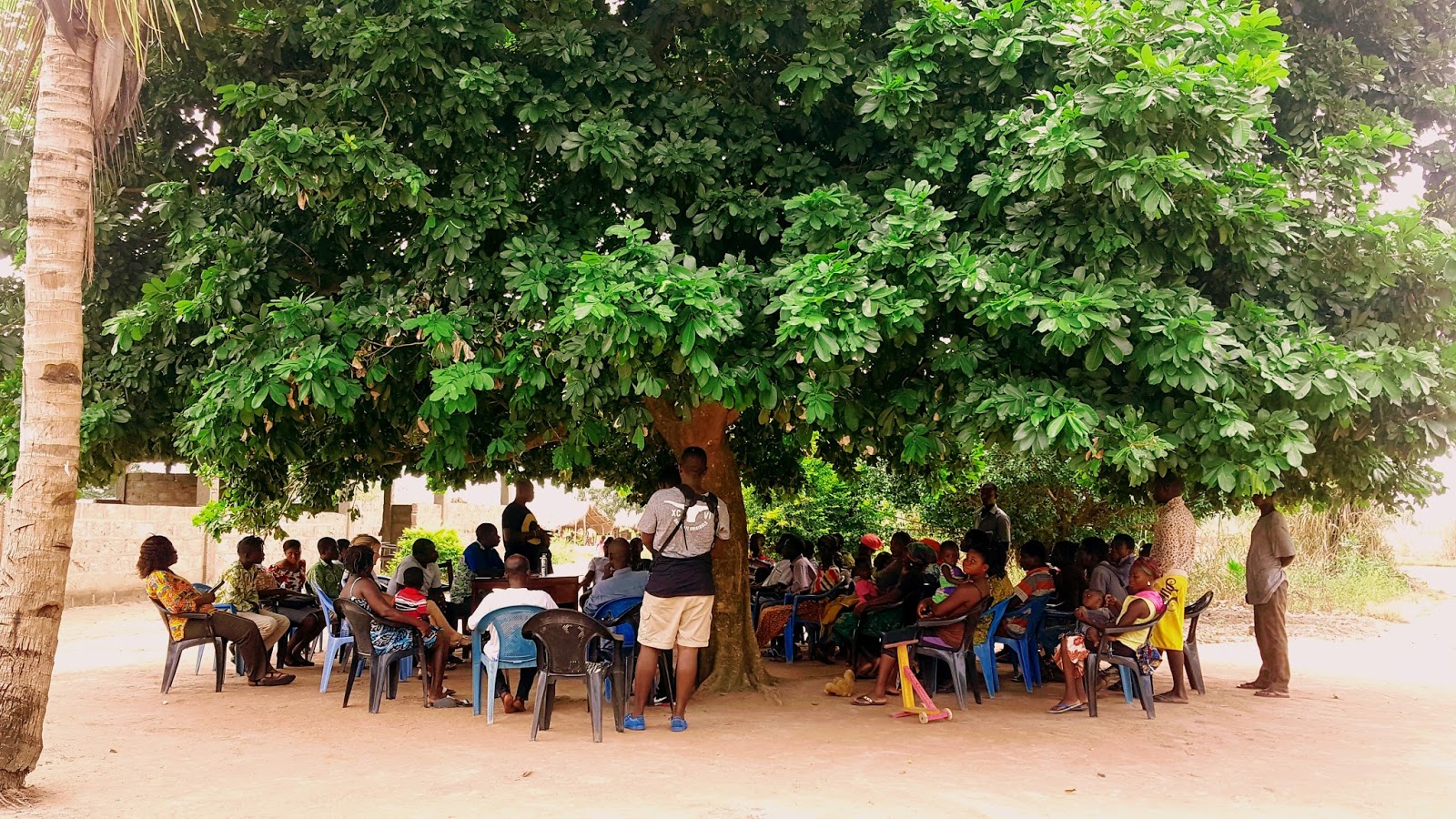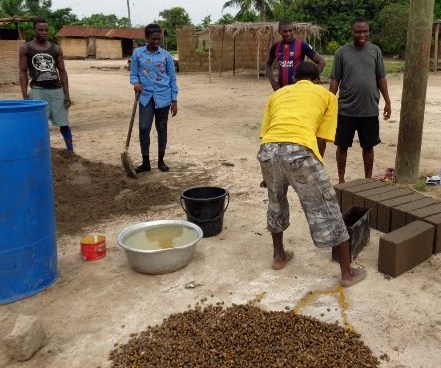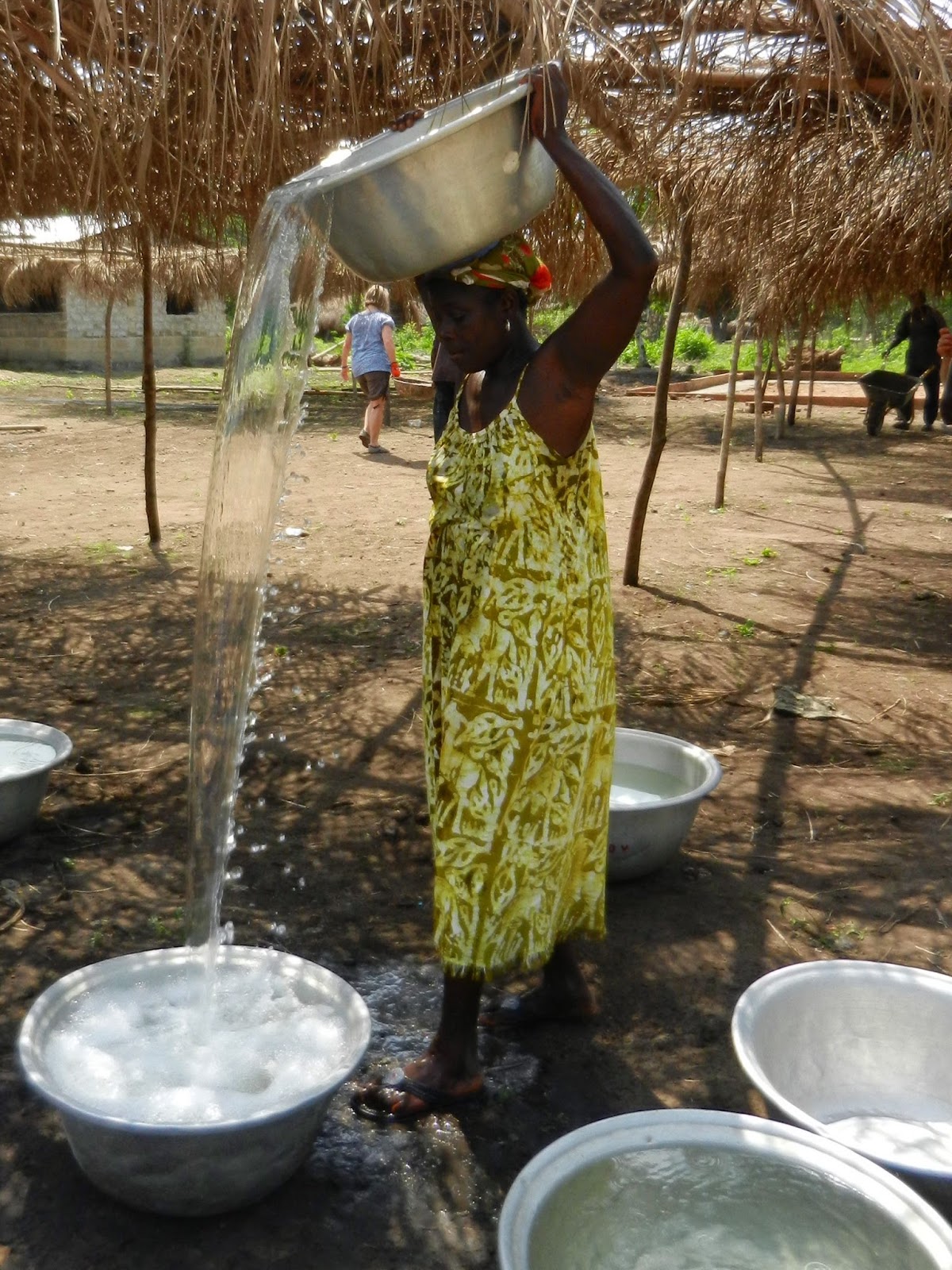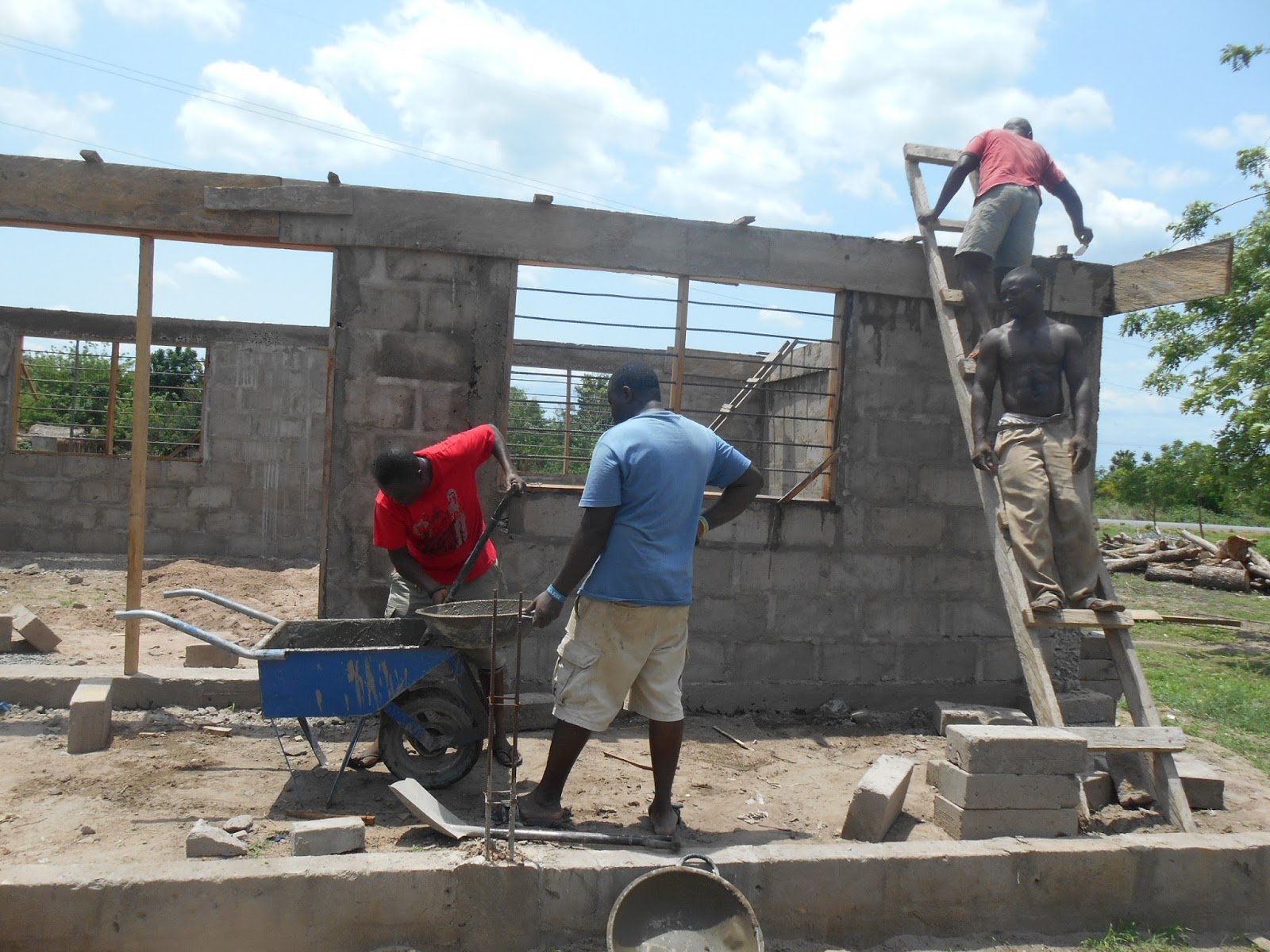ADANU Ghana – empowerment of communities in Ghana
By
Denise Nanni and Milena Rampoldi, ProMosaik. In the following our interview ADANU in Ghana where we talked to Betsy
Benoit. She told us: What we do at Adanu is build beyond schools. We use
schools as a platform to train entire communities about collaboration,
empowerment and creating their own bright future. We would like to thank her
for her detailed answers and the photos she sent us.
Denise Nanni and Milena Rampoldi, ProMosaik. In the following our interview ADANU in Ghana where we talked to Betsy
Benoit. She told us: What we do at Adanu is build beyond schools. We use
schools as a platform to train entire communities about collaboration,
empowerment and creating their own bright future. We would like to thank her
for her detailed answers and the photos she sent us.

What are the main problems rural communities face in Ghana?
Inadequate
access to quality education
access to quality education
* Rural schools lack basic infrastructure
for teaching and learning. They generally have Primary Classes 1-6, with
addition Kindergarten in 2004. Students
might travel up to 8 kilometers to the closest Junior High Schools, and most
Senior High Schools require children to board there as SHS are few and far
between.
for teaching and learning. They generally have Primary Classes 1-6, with
addition Kindergarten in 2004. Students
might travel up to 8 kilometers to the closest Junior High Schools, and most
Senior High Schools require children to board there as SHS are few and far
between.
* Students and teachers struggle
to get basic curriculum needs, such as textbooks, pencils, chalk and notebooks.
Items the curriculum call for in areas such as Science and Creative Arts are
rare. For computer learning, teachers usually have to draw the computer
components on chalkboards to explain what a computer, mouse and monitor look
like.
to get basic curriculum needs, such as textbooks, pencils, chalk and notebooks.
Items the curriculum call for in areas such as Science and Creative Arts are
rare. For computer learning, teachers usually have to draw the computer
components on chalkboards to explain what a computer, mouse and monitor look
like.
* Accommodations for the teachers is also a major problem. Oftentimes there is no clean water or
electricity, and the hut is very basic. Due to the rough conditions, many
teachers don’t accept a posting/transfer to rural villages.
electricity, and the hut is very basic. Due to the rough conditions, many
teachers don’t accept a posting/transfer to rural villages.
Inadequate
access to quality health care information
access to quality health care information
*Most villages don’t have health clinics.
To access healthcare people often must travel many kilometers by foot. This is
very difficult for someone who is ill, often leading people to rely on local
remedies or nothing at all.
To access healthcare people often must travel many kilometers by foot. This is
very difficult for someone who is ill, often leading people to rely on local
remedies or nothing at all.
*The distance to the closest health care
facility is so far that oftentimes a woman going into labor cannot get there in
time for the delivery.
facility is so far that oftentimes a woman going into labor cannot get there in
time for the delivery.
Lack of
clean water
clean water
* Most rural communities don’t
have access to portable drinking water, leading to illnesses, dehydration, and
death.
have access to portable drinking water, leading to illnesses, dehydration, and
death.
* Water sources such as rivers
and ponds are usually contaminated because they are also used by cattle, goats
and other animals.
and ponds are usually contaminated because they are also used by cattle, goats
and other animals.
* Clean water sources might exist
many kilometers from the village, and water collection becomes a chore taking
an entire day. In a village we recently visited, a plea was made by several
women to free them of the 6 kilometer walk every day to fetch clean water. It took time away from their families and
other chores, making any hope of a bright future dim.
many kilometers from the village, and water collection becomes a chore taking
an entire day. In a village we recently visited, a plea was made by several
women to free them of the 6 kilometer walk every day to fetch clean water. It took time away from their families and
other chores, making any hope of a bright future dim.
Lack of
alternate source of livelihood besides subsistence seasonal farming
alternate source of livelihood besides subsistence seasonal farming
* Most rural communities’ main
occupation is farming. During the dry season farming is very tenuous, adversely
affecting their income as well as their own food supply.
occupation is farming. During the dry season farming is very tenuous, adversely
affecting their income as well as their own food supply.
* Other than farming, there are
no skills or training in other areas for the youth and women, leading to a
pervading sense that nothing will ever change, because it never has.
no skills or training in other areas for the youth and women, leading to a
pervading sense that nothing will ever change, because it never has.
Inadequate
access to government policies and programs
access to government policies and programs
* Most rural community members don’t
feel they have the voice to speak up for themselves.
feel they have the voice to speak up for themselves.
* Rural areas are known as
‘underserved’. The government doesn’t often make an appearance at smaller sized
villages, and in turn the community doesn’t know who to go to or how to ask for
help. Towns and large groups of villages
that are fortunate to have the ear of a local government official are much more
likely to benefit from government programs, as they know what the programs are,
and who to ask to gain access to them.
‘underserved’. The government doesn’t often make an appearance at smaller sized
villages, and in turn the community doesn’t know who to go to or how to ask for
help. Towns and large groups of villages
that are fortunate to have the ear of a local government official are much more
likely to benefit from government programs, as they know what the programs are,
and who to ask to gain access to them.
Inadequate
access to sanitation and environmental issues
access to sanitation and environmental issues
* In the Volta Region, toilet
facilities are known as a “Place of Convenience”. Not many exist where Adanu works, meaning
that ‘open defecation’ is quite common. If toilets do exist, they are usually
communal pit toilets. These types of toilets are smelly, attract flies, and
have to be moved regularly. This leads
to filling over untreated human waste, only to repeat the process in 1-5 years.
facilities are known as a “Place of Convenience”. Not many exist where Adanu works, meaning
that ‘open defecation’ is quite common. If toilets do exist, they are usually
communal pit toilets. These types of toilets are smelly, attract flies, and
have to be moved regularly. This leads
to filling over untreated human waste, only to repeat the process in 1-5 years.
* Due to lack of available water
and cost, water flushing toilets (Western style) are inappropriate.
and cost, water flushing toilets (Western style) are inappropriate.

In what does the unique approach of Adanu community
development consist of?
development consist of?
Adanu selects communities based on their
level of need and willingness to contribute a significant portion of time,
labor and materials to the project. Adanu specifically targets communities that
have been neglected by the government.
level of need and willingness to contribute a significant portion of time,
labor and materials to the project. Adanu specifically targets communities that
have been neglected by the government.
A key component of The Adanu Model is each
community must show commitment to their development by contributing materials
and labor to the project. In situations where the community cannot provide
resources, Adanu will, together with the community, appeal for support from the
other government stakeholders.
community must show commitment to their development by contributing materials
and labor to the project. In situations where the community cannot provide
resources, Adanu will, together with the community, appeal for support from the
other government stakeholders.
Community-led working committees are
formed, and resources are committed to the project. Community members and
leaders drive the project to completion.
formed, and resources are committed to the project. Community members and
leaders drive the project to completion.
o
Adanu engages the community by meeting key stakeholders (Chief and
Elders, Teachers, assembly person) to solicit their views and ensure they agree
on the project and The Adanu Model before the project is implemented.
Adanu engages the community by meeting key stakeholders (Chief and
Elders, Teachers, assembly person) to solicit their views and ensure they agree
on the project and The Adanu Model before the project is implemented.
o
The Adanu Model starts with a small project (school urinal or water tank)
to determine the true level of the community’s commitment and enthusiasm. The project takes 3-5 days, allowing for
Adanu and the stakeholders to measure their ability to complete a project as
envisioned.
The Adanu Model starts with a small project (school urinal or water tank)
to determine the true level of the community’s commitment and enthusiasm. The project takes 3-5 days, allowing for
Adanu and the stakeholders to measure their ability to complete a project as
envisioned.
Adanu supervises critical stages of the
project, whether small or large, and checks in regularly with working
committees to keep the community accountable and on track. Volunteers, both
local and international, engage with the community at different stages of the
project to develop relationships, provide encouragement and support projects.
project, whether small or large, and checks in regularly with working
committees to keep the community accountable and on track. Volunteers, both
local and international, engage with the community at different stages of the
project to develop relationships, provide encouragement and support projects.
SUMMARY
OF ADANU MODEL
OF ADANU MODEL
The Adanu Model empowers communities
because they contribute their own resources, both material and human. It is an
educational and collaborative process, leading to growth and development of the
community.
because they contribute their own resources, both material and human. It is an
educational and collaborative process, leading to growth and development of the
community.
Adanu’s human-centered concept ensures our
projects are sustainable. After selecting communities, we actively engage with
them by involving them in all stages of the project. This engagement is not
just with the leadership, but the with entire community.
projects are sustainable. After selecting communities, we actively engage with
them by involving them in all stages of the project. This engagement is not
just with the leadership, but the with entire community.
The participation process helps create
ownership of the project, and community members feel recognized and valued as
their suggestions are acknowledged and adopted. It also helps them better
understand the importance of the project, empowering them to give their very
best.
ownership of the project, and community members feel recognized and valued as
their suggestions are acknowledged and adopted. It also helps them better
understand the importance of the project, empowering them to give their very
best.

Which programs do you carry on?
Adanu focuses on both formal (school) and informal (scheduled
and unscheduled interactions to create awareness on importance of education,
why and how they should contribute to projects) education of the community. Adanu stresses that government alone cannot
give them or their children everything they want, so the community needs to
step in and accomplish whatever they can to supplement what the government
does. Adanu strongly encourages a vibrant and proactive Parent Teacher Association
(PTA), teaches handwashing and importance of using clean water, build urinals
on school grounds for students and teachers, build schools (Kindergarten and
Primary 1-6, also JHS and SHS), clean water projects (rain water collection
using gutters on new schools), libraries and computer labs, and women-focused
enterprise.
and unscheduled interactions to create awareness on importance of education,
why and how they should contribute to projects) education of the community. Adanu stresses that government alone cannot
give them or their children everything they want, so the community needs to
step in and accomplish whatever they can to supplement what the government
does. Adanu strongly encourages a vibrant and proactive Parent Teacher Association
(PTA), teaches handwashing and importance of using clean water, build urinals
on school grounds for students and teachers, build schools (Kindergarten and
Primary 1-6, also JHS and SHS), clean water projects (rain water collection
using gutters on new schools), libraries and computer labs, and women-focused
enterprise.
Adanu’s programs, along with community collaboration, empower
all to understand the importance of education for the individual, the
community, and for Ghana itself.
all to understand the importance of education for the individual, the
community, and for Ghana itself.
Students
attending our jointly-built schools are apt to attend school longer. After 15
years, we have many examples of how we have helped shift of ideas about school
and what it can offer; kids who were ready to quit school are coming back from
college and thanking Adanu for encouraging them. They see how Adanu helped
their communities build strong education structures and values.
attending our jointly-built schools are apt to attend school longer. After 15
years, we have many examples of how we have helped shift of ideas about school
and what it can offer; kids who were ready to quit school are coming back from
college and thanking Adanu for encouraging them. They see how Adanu helped
their communities build strong education structures and values.
Adanu builds beyond
schools – we also build libraries and computer labs. Besides promoting reading
and writing for young and old alike, students can confidently compete with
students in the cities, testing well for spots in high schools and colleges.
schools – we also build libraries and computer labs. Besides promoting reading
and writing for young and old alike, students can confidently compete with
students in the cities, testing well for spots in high schools and colleges.
Do you address any specific action to women’s rights and
empowerment?
empowerment?
Adanu focuses special attention on girls to
be in school (scholarships, pads for menstrual cycles, personal hygiene
education and family planning to prevent teenage pregnancy)
be in school (scholarships, pads for menstrual cycles, personal hygiene
education and family planning to prevent teenage pregnancy)
We create opportunities for social enterprise
to empower women in the community. The goal is to help them create better lives
for themselves and enhance their ability to care for their children and
families (Batik making, Bead making, sewing, Tie & Dye making)
to empower women in the community. The goal is to help them create better lives
for themselves and enhance their ability to care for their children and
families (Batik making, Bead making, sewing, Tie & Dye making)
Adanu works with the community so women’s
voices are heard during meetings and community events. Adanu ensures women are
given decision-making opportunities. When Adanu works with a community we make
sure women are fully represented in all the groups formed that supervise our projects.
We have women leaders mobilizing other women for activities such as cooking
lunch for students and literacy classes.
voices are heard during meetings and community events. Adanu ensures women are
given decision-making opportunities. When Adanu works with a community we make
sure women are fully represented in all the groups formed that supervise our projects.
We have women leaders mobilizing other women for activities such as cooking
lunch for students and literacy classes.

Do you cooperate with local authorities and institutions? If
yes, how?
yes, how?
We consult, cooperate and coordinate with
the relevant local authorities and institutions. These include
Assemblymen/women in the community, Members of Parliament, District, Municipal
and Metropolitan Assemblies, Ministries, Departments and Agencies. Together
with the community Adanu identifies, engages and implements projects based on challenges
and sustainable solutions identified.
the relevant local authorities and institutions. These include
Assemblymen/women in the community, Members of Parliament, District, Municipal
and Metropolitan Assemblies, Ministries, Departments and Agencies. Together
with the community Adanu identifies, engages and implements projects based on challenges
and sustainable solutions identified.
Because we make sure all stakeholders are
fully represented and engaged in each project, the project is much more likely
to be successful. For example, when we build a school we will reach out to the
Ministry of Education, Ghana Education Service, the office of Member of
Parliament, the District Assembly and other relevant institutions. Each of these
institutions have special roles to play – the Member of Parliament together
with the District Assembly help provide building materials like sand and
crushed rocks, while the Ministry of Education and Ghana Education service
provide trained teachers once a school is completed.
fully represented and engaged in each project, the project is much more likely
to be successful. For example, when we build a school we will reach out to the
Ministry of Education, Ghana Education Service, the office of Member of
Parliament, the District Assembly and other relevant institutions. Each of these
institutions have special roles to play – the Member of Parliament together
with the District Assembly help provide building materials like sand and
crushed rocks, while the Ministry of Education and Ghana Education service
provide trained teachers once a school is completed.
ADDITIONAL COMMENTS:
March
22 marks Adanu’s 15th Anniversary as a registered nonprofit
organization in Ghana. We have a book coming out in the Fall that we
hope will give others insight into our successes and challenges, and how Adanu
embraces human-centered, sustainable development.
22 marks Adanu’s 15th Anniversary as a registered nonprofit
organization in Ghana. We have a book coming out in the Fall that we
hope will give others insight into our successes and challenges, and how Adanu
embraces human-centered, sustainable development.
Adanu is also launching our Adanu app,
letting people see progress in each village, updates on social media, secure
and fast donation platform. Available FREE in both Android and iOS stores.
letting people see progress in each village, updates on social media, secure
and fast donation platform. Available FREE in both Android and iOS stores.
 QR code for all stores
QR code for all stores

